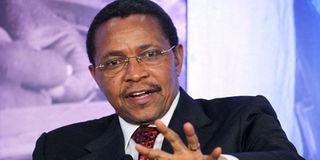TALKING POINT : Why Kikwete should mediate in Zanzibar political crisis

Retired President Jakaya Kikwete
What you need to know:
- Authorities across the United Republic of Tanzania should revive talks that will lead to the return of peace and stability in the twin islands of Unguja and Pemba. But how is this possible? Shouldn’t President John Magufuli appoint his predecessor, Mr Jakaya Kikwete, to lead political reconciliation in Zanzibar?
There was advice given on Easter weekend on the political situation in Zanzibar, which, unfortunately, has not made headlines. Some diplomatic circles were of the opinion that the political situation in Zanzibar needed serious intervention to ease tensions that have existed for nearly two years.
Authorities across the United Republic of Tanzania should revive talks that will lead to the return of peace and stability in the twin islands of Unguja and Pemba. But how is this possible? Shouldn’t President John Magufuli appoint his predecessor, Mr Jakaya Kikwete, to lead political reconciliation in Zanzibar?
The starting point should be a conversation on how to get Zanzibar back to the Government of National Unity (GNU) arrangement, which was adopted after years of trial-and-error talks that began almost immediately after the first multiparty elections in 1995. Year in, year out, elections have become a highly polarizing factor in the isles. The lack of mitigation strategies continues to be a major concern.
So what should be done now that the constitutionally guaranteed GNU has been cast aside? First, there is a need for a national constitutional dialogue in Zanzibar that will appraise the political situation in Tanzania, particularly in Zanzibar, following the highly contentious March 20, 2016 repeat elections. There are questions from the nullification of the October 25, 2015 election results that have yet to be answered. Was it necessary for the chair of the Zanzibar Electoral Commission (ZEC) to announce cancellation of the results? Was this a collective decision by ZEC or a unilateral one by Mr Jecha Salum Jecha? Was it constitutional? Were there no other options?
Also, what have been the implications of the cancellation of the results and the subsequent election re-run? Why was it deemed that parliamentary elections were valid, while the presidential and representative ballots were void? What precedence has this set for elections in 2020 and beyond? Can we leave it like this and hope that the situation will just normalise, or should there be deliberate efforts to sort out the political stalemate currently lingering in Zanzibar? These and many other questions need answers that cannot be given in a brief opinion piece such as this one.
Obviously, talks are crucial. Retired President Kikwete, during whose tenure Zanzibar made great progress that culminated in the GNU arrangement in 2010, should be the chief mediator in any new round of talks that need to start sooner rather than later. Mr Kikwete is a level-headed person with the requisite qualities and experience to lead dialogue in such a divided society as Zanzibar.
As things stands now, virtually all the GNU provisions in the Constitution of Zanzibar, 1984 (2010) have been violated. This is partly because it had previously never been envisaged that any one party would be able to win an election in Zanzibar by the margin achieved by CCM in last year’s repeat elections. Had CUF not boycotted the poll, it would not have been possible for CCM to win 91.8 per cent of the vote in the presidential election. It would also have been unthinkable for CCM to win all 54 seats in the House of Representatives. It simply would not have happened.
Hence Zanzibar today is in violation of Article 9 (3) of its own constitution. This provision states that the Revolutionary Government of Zanzibar shall be constituted on a GNU arrangement. This is aimed at maintaining and promoting peace, unity and stability in Zanzibar and the entire United Republic of Tanzania. Additionally, Article 39 (1) requires that Zanzibar be led by a president assisted by two vice presidents. Accordingly, the First Vice President is supposed to be appointed from and in consultation with the party that emerges second in elections. The party must garner at least 10 per cent of the vote. This is a constitutional and legal requirement in accordance with Section 21 of Act No. 9 of 2010.
In the same vein, the First Vice President is the chief adviser to the President on matters of national concern, according to Article 39 (7). Hence, one wonders who should be advising the President of Zanzibar now that there is no First Vice President. Although the Second Vice President also advises the President, it is meant to be on matters relating to government business in the House of Representatives given that he is the leader of government business in the House.
The inability to appoint a first vice president is in itself a clear manifestation of the political chaos Zanzibar has been plunged into.




